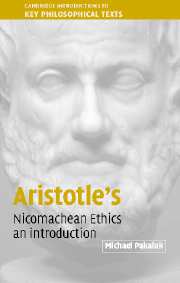Book contents
- Frontmatter
- Contents
- Preface
- 1 Reading Aristotle's Nicomachean Ethics
- 2 The goal of human life (Nicomachean Ethics, book 1)
- 3 Character-related virtue (Nicomachean Ethics 1.13 and book 2)
- 4 Actions as signs of character (Nicomachean Ethics 3.1–5)
- 5 Some particular character-related virtues (Nicomachean Ethics 3.6–4.9)
- 6 Justice as a character-related virtue (Nicomachean Ethics, book 5)
- 7 Thinking-related virtue (Nicomachean Ethics, book 6)
- 8 Akrasia, or failure of self-control (Nicomachean Ethics 7.1–10)
- 9 Friendship (Nicomachean Ethics, books 8 and 9)
- 10 Pleasure (Nicomachean Ethics 7.11–14 and 10.1–5)
- 11 Happiness (Nicomachean Ethics 10.6–9)
- References
- Index
3 - Character-related virtue (Nicomachean Ethics 1.13 and book 2)
Published online by Cambridge University Press: 05 June 2012
- Frontmatter
- Contents
- Preface
- 1 Reading Aristotle's Nicomachean Ethics
- 2 The goal of human life (Nicomachean Ethics, book 1)
- 3 Character-related virtue (Nicomachean Ethics 1.13 and book 2)
- 4 Actions as signs of character (Nicomachean Ethics 3.1–5)
- 5 Some particular character-related virtues (Nicomachean Ethics 3.6–4.9)
- 6 Justice as a character-related virtue (Nicomachean Ethics, book 5)
- 7 Thinking-related virtue (Nicomachean Ethics, book 6)
- 8 Akrasia, or failure of self-control (Nicomachean Ethics 7.1–10)
- 9 Friendship (Nicomachean Ethics, books 8 and 9)
- 10 Pleasure (Nicomachean Ethics 7.11–14 and 10.1–5)
- 11 Happiness (Nicomachean Ethics 10.6–9)
- References
- Index
Summary
The state of Aristotle's argument near the end of book 1 of the Ethics is as follows. There is an ultimate goal of human life, namely whatever is the aim of that expertise which is required in order reasonably to govern political society. We can be assured that there is such an aim, and such an expertise, Aristotle supposes, because political society is a natural form of association for human beings and therefore has a definite purpose or goal. We can identify three (or perhaps only two) criteria which such a goal must satisfy: it must have the marks of Ultimacy, Self-Sufficiency, and (perhaps also) greatest Preferability. We can also identify, roughly, the general sort of thing that this ultimate goal is going to be: as Aristotle maintains in the Function Argument, the ultimate goal of human life involves some activity which a human being can accomplish only through his having a trait that contributes toward someone's being a good human being. Such a trait is a “virtue,” so the ultimate goal of human life is some “activity in accordance with virtue.” We can determine the ultimate goal of human life, then, by looking at activities of that sort and seeing which of them satisfy the criteria of Ultimacy, Self-Sufficiency, and greatest Preferability.
- Type
- Chapter
- Information
- Aristotle's Nicomachean EthicsAn Introduction, pp. 87 - 117Publisher: Cambridge University PressPrint publication year: 2005

